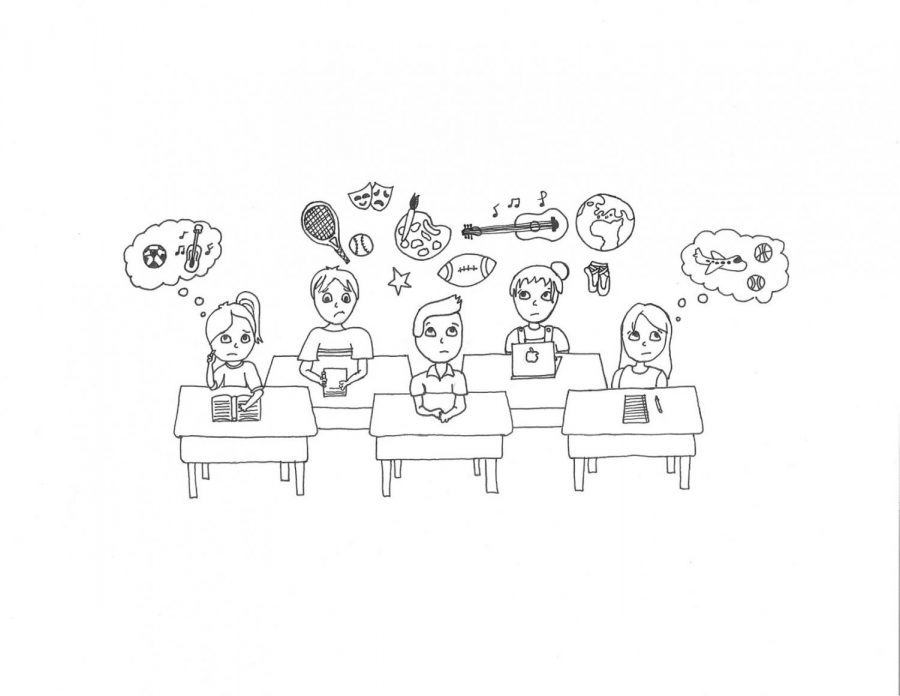Students who miss school for extracurriculars should be accommodated
Credit: Dylan Wade
June 5, 2018
Hackley proudly publicizes the extracurriculars and travel opportunities available for its students. Along with these opportunities, however, often come substantial consequences for students, since many of these opportunities coincide with class days. Because of their workload, they fear missing assignments and are often unwilling to take advantage of the extracurriculars Hackley has to offer. The Dial Editorial Board believes that teachers must strive to understand the importance of these experiences, and enable students to take advantage of extracurricular opportunities. It is the job of not only the students to voice their grievances, but also the administration to help find a common ground.
Activities ranging from athletics to Round Square trips cause students to live in fear of missing work because, at Hackley, academics are often a top priority for students. If a student misses an assignment, their teacher places them in Academic Detention, which is the universal response of Hackley teachers to missed assessments. Steele Sternberg stated, “We are first and foremost an academic place and those athletic sacrifices are things that, while regrettable, are the nature of the relationship between the arts, the athletics, and academics in this school,” he explained.
With the understanding that academics come before everything else, students are unsure of whether or not their teachers are willing to accomodate them. If a student feels that their teacher has treated them unfairly, they must bring their grievances to the department head, exercising self advocacy. If they cannot reach an agreement with their teacher, there is nothing to be done. The lack of a specific policy between teachers is what allows them to teach at their best, unconstricted by specific guidelines, but pressuring students with deadlines is not the only solution. Instead, teachers should understand that making up homework should not be a top priority, only causing added stress for their students.
“I feel like if I miss school for a trip then I would just have that much more work to catch up on,” said junior Daamiya Mir of Hackley’s rigorous academics.
For students and teachers, falling behind is a large fear. Sternberg explains that he prefers his students make up major assessments as soon as possible. While this makes sense for students not to fall behind, it creates added stress. Some teachers have failed to reach a common understanding of the importance of these experiences to their students, as exemplified in a general lack of empathy in assignments.
The same is true for the school’s travel abroad opportunities. Next fall, Hackley students have the chance to travel to Canada for a Round Square conference. As a newly minted leader of the program, Sternberg revealed that the majority of applicants are underclassmen. The trip will cause students to miss a week of school, so juniors and seniors with higher workloads are steering clear of any chance to fall behind.
While the Conference is a unique opportunity, students would rather opt out in order to maintain their workload. While this may be the stigma around Round Square, the longtime Hackley representative, Adrianne Pierce says that applicants have spanned through all grades. She is referring to the state of stress that embodies the student body in terms of missing assignments.
Regardless, Pierce believes that students are not set up for failure in this sense. “It is a bit easier, I suspect, for sophomores to manage this absence and make up the work,” she said. Even so, “we have worked to help the faculty understand the value of these experiences and to modify the expectation of make-up work for these students when they return,” she added. Understanding among teachers of the value of these experiences leads increased sympathy towards their students.
Assistant Head of School Steven Bileca elaborated, describing how students on Round Square trips are given their assignments in advance. These are expected to be completed before the students return to school. These assignments mean that students will still be still left with the burden of their work during the trip. In this scenario at least the students know what work they have to complete and that, “ goes a long way toward relieving some of the pressure of the ‘unknown,’” argues Bileca.
The intense workload placed upon Hackley students encourages academic enrichment, but it also prevents students from taking advantage of many extracurricular activities. Administrators need to enable students to take advantage of what Hackley offers beyond academics.

